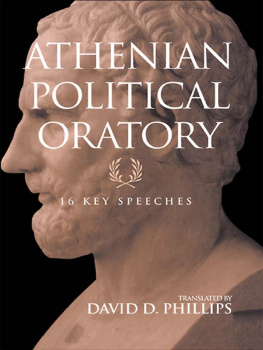ATHENIAN POLITICAL ORATORY
Published in 2004 by Routledge 29 W 35th Street New York, NY 10001 http://www.routledgeny.com/
Published in Great Britain by Routledge 11 New Fetter Lane London EC4P 4EE
http://www.routledge.co.uk/
Copyright 2004 by Taylor & Francis Books, Inc.
Routledge is an imprint of the Taylor & Francis Group.
This edition published in the Taylor & Francis e-Library, 2005.
To purchase your own copy of this or any of Taylor & Francis or Routledges collection of thousands of eBooks please go to http://www.ebookstore.tandf.co.uk/.
All rights reserved. No part of this book may be reprinted or reproduced or utilized in any form or by any electronic, mechanical, or other means now known or hereafter in vented, including photocopying and recording, or in any information storage or re trieval system, without permission from the publishers.
Library of Congress Cataloging-in-Publication Data
Phillips, David D., 1971 Athenian political oratory: sixteen key speeches/David D.Phillips. p. cm. Includes bibliographical references and index. ISBN 0-415-96609-4 (HB:alk. paper)ISBN 0-415-96610-8 (PB:alk. paper) 1. Athens (Greece)HistorySources. I. Title. DF285. p47 2004
938.5dc22 2004002080
ISBN 0-203-33510-4 Master e-book ISBN
ISBN 0-415-96610-8 (Print Edition)
Preface
This book is designed primarily to provide students of Greek history with a collection of translated speeches illustrating political developments between the end of the Peloponnesian War (404 B.C.) and the death of Alexander the Great (323 B.C.). The speeches in this collection were delivered in Athens: some in the Assembly, others in courts of law. All but one were written by residents of Athens; the sole exception, a letter penned by Philip II of Macedon, was read out to the Athenian Assembly by an ambassador. These speeches, therefore, are sources of first importance for Athenian domestic and foreign politics.
I have chosen to focus on three areas where oratory provides especially valuable and copious evidence: the regime of the Thirty Tyrants, the conflict between Athens and Philip, and Athens during the reign of Alexander. Therefore, after a General Introduction that provides readers with the basic facts they need to know before reading the speeches, the book is divided into three parts, with one part dedicated to each of the periods mentioned above. Each part opens with a brief narrative history of the period, followed by the speeches, each of which has its own introduction. Footnotes are appended to provide both an explanation of references and comparison with other relevant passages.
In selecting the speeches for this volume, I have taken into consideration their utility in undergraduate Greek history courses. Accordingly, I have left out the invaluable Embassy and Crown speeches of Aeschines and Demosthenes because their length might well deter instructors from assigning them and students from reading them. On the other hand, I have included Demosthenes Assembly speeches from the decade 351 to 341 including the Olynthiacs and Philippics, some of the most celebrated speeches from classical antiquityso that readers can watch Athenian policy toward Macedon as it develops during this crucial period.
Where possible I have endeavored to represent both sides of an issue, as far as the genre allows. Lysias 12 and 13 were delivered by relatives of men killed by the Thirty Tyrants; in Lysias 16 we hear the voice of an accused former supporter of the Thirty. Further, in order to compensate somewhat for the monolithic presence of Demosthenes, I have included one speech by his ally Hegesippus and one by his enemy Philip, not to mention Hypereides 5, which serves as a useful corrective to Demosthenes pronouncements of selfless patriotism.
I am pleased to record my gratitude to those scholars who have offered useful commentary and advice: Professor Rex Stem of Lousiana State University, Professor H.D.Cameron of the University of Michigan, and Professor K.A.Garbrah of the University of Michigan. I am also indebted to William Germano and Damon Zucca at Routledge for their skill and patience, and to several anonymous readers. All remaining errors, of course, are mine.
For the translations I have used the Oxford Classical Texts of Lysias and Demosthenes by C.Hude and M.R.Dilts, respectively; for Hypereides I have used C.Jensens Teubner edition. In preparing the translations and footnotes I have consulted a number of excellent commentaries and translations, to which my debt will be obvious. Among these I have found particularly useful C.D.Adams and S.C. Todd on Lysias, J.E.Sandys on Demosthenes, H.Weil on [Demosthenes] 7 and 12, and D.Whitehead on Hypereides. A full bibliography appears at the end of the book.
In the text and footnotes I refer to speeches included in this collection by author, speech number, and section number (e.g., Demosthenes 1.1). Speeches not included in this book are cited by author, speech number and title, and section number (e.g., Demosthenes 54 Against Conon 1). The order of speeches has been standardized in the corpus of every orator except Hypereides; Kenyons OCT, Jensens Teubner, and Colins Bud all number Hypereides speeches differently. One can only hope that the European Union will take cognizance of this situation and impose a uniform standard. For now, although I translate Jensens text, I use Kenyons numbering. Other works are cited according to standard scholarly convention. The abbreviation Ath. Pol. is used for the pseudo-Aristotelian Constitution of the Athenians (Athnain Politeia).
In the following places I diverge from the texts as printed by their respective editors:
- Lysias 12.25: stet

- Lysias 12.62: del.

- Lysias 13.37: add.
 (Aldus)
(Aldus) - Demosthenes 4.49:
 (
( Dilts)
Dilts) - Demosthenes 2.14: stet

- Demosthenes 3.11:
 (
( Dilts)
Dilts) - Demosthenes 3.27:
 (
( Dilts)
Dilts) - Demosthenes 3.33: stet

- Demosthenes 5.16:











 (Aldus)
(Aldus) (
( Dilts)
Dilts)
 (
( Dilts)
Dilts) (
( Dilts)
Dilts)
